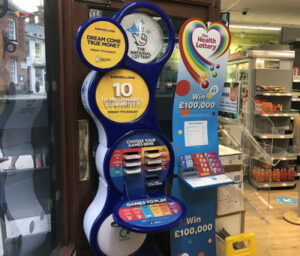 The UK National Lottery has been active since 1994, that’s almost 30 years of operation, and when people in the UK think of lotteries this is the one that springs to mind.
The UK National Lottery has been active since 1994, that’s almost 30 years of operation, and when people in the UK think of lotteries this is the one that springs to mind.
Yet there are some who believe that Premium Bonds are also a type of lottery, and we’re here to look into whether this is true or not.
If official laws define it as a lottery, how is it regulated?
After all, they aren’t just for adults, parents can buy these bonds for their children as well. Yet, gambling is not something that UK law allows for residents under 18 in most cases, therefore, how is it that premium bonds are purchasable for children, but lottery tickets are not?
If you want to find out more about Premium Bonds and how similar they are to the lottery, you’re in the right place.
What Are Premium Bonds?
 The description of a Premium Bond is a lottery bond issued by the UK government.
The description of a Premium Bond is a lottery bond issued by the UK government.
They first came into operation in 1956, although “premium bond” is a term from the late 18th century. It describes a bond that does not earn interest, but it is eligible for entry into a lottery.
Yet the modern-day iteration of Premium Bonds came about from Harold Macmillan. On April 17th, 1956, he served as Chancellor of the Exchequer. It was on this date that he announced the forthcoming Budget. Premium Bonds were a part of it, and Macmillan said they were there to control inflation. The bonds would also encourage people to save money.
In November of the same year, the Lord Mayor of London purchased the very first bond. It cost him £1. Councillor William Crook bought the second one.
The principle behind Premium Bonds is simple. Instead of staking an amount by buying a lottery ticket, the interest on bonds gets distributed. That occurs by a lottery, with every single bond entered into a monthly prize draw. The government also promises to buy them back, on request, for their original price. It is also the government that pays interest into the bond fund. This is at a rate of 4.65% per year as of 2023.
A random number generator (RNG) machine is in operation to determine the winners each month. It goes by the name of ERNIE (Electronic Random Number Indicator Equipment). Premium Bond holders can win prizes between £25 and £1,000,000 each month, and investors have the chance to buy more bonds at any time. They must hold these for a whole calendar month before they qualify for a prize, but any bonds purchased by reinvestment of prizes are eligible straight away. Each person may own Premium Bonds up to a value of £50,000, and the holder may cash them out whenever they like.
Official Regulation

How can something like this exist in the UK when specific laws are in place for lotteries? Well, as explained, residents don’t stake an amount on a ticket. Instead, they hold bonds that ERNIE selects at random every month to win a prize based on interest. The Premium Savings Bonds Regulations 1972 explains more on this.
It came into operation on July 1, 1972, and interprets the bonds as follows:
“…a premium savings bond issued by the Treasury, through the department of the Postmaster General or under the auspices of the Director of Savings, for the purpose of raising money under section 1 of the National Loans Act 1939 or section 12 of the National Loans Act 1968.”
The legislation also confirms details on the persons entitled to buy bonds as:
- A bond can be bought by anyone who has attained the age of sixteen years, being a person who is not under any legal disability otherwise than by reason of his age.
- A bond cannot be purchased or held by more than one person or by a body of persons, whether corporate or unincorporate.
- A bond may be purchased on behalf of and in the name of a person under the age of sixteen years by his parent or guardian or by any person who satisfies the Director of Savings that he is a proper person to act on behalf of the first mentioned person; and any bond so purchased shall be deemed to be held by the person on whole behalf it is purchased.
At the time of this legislation, a maximum of £2,000 per person in bonds was possible. Various amendments to the legislation have taken place over the years and now you can own up to £50,000 in Premium Bonds. Other wording and slight rule changes have also occurred alongside. Yet the principle behind them remains the same.
Why Save with Premium Bonds?
 If Premium Bonds are akin to a lottery, why not go ahead and buy a National Lottery ticket? Well, there is nothing to stop you from doing both, of course. Yet they operate in a different way. National Savings and Investments (NS&I) is the official ruling body for Premium Bonds.
If Premium Bonds are akin to a lottery, why not go ahead and buy a National Lottery ticket? Well, there is nothing to stop you from doing both, of course. Yet they operate in a different way. National Savings and Investments (NS&I) is the official ruling body for Premium Bonds.
It provides three points about why saving with the bonds is a good idea:
- Most banks only guarantee your savings up to £85,000. NS&I is the only provider that secures 100% of your monetary savings, regardless of the amount you invest.
- Premium Bonds are backed by HM Treasury, and it has more than a 160 year track record of helping residents of the UK to save.
- NS&I created Premium Bonds and they are only available straight from the source. It takes a couple of minutes to open an account and then you can buy bonds, and you could win in the monthly prize draws.
All prizes won via Premium Bonds are tax-free cash. Anyone winning £1 million gets the whole £1 million, for example. The prize rate increased to 4.65% in 2023, which was the highest rate in 15 years. As a result, £30 million more in prizes became winnable from the bonds.
Here are a few facts about Premium Bonds, including the odds of winning:
- The odds of winning are 21,000 to 1 for every £1 bond. This changes each time to prize rate changes.
- The equivalent interest rate (although it’s not a real interest rate) stands at 4.65%.
- All prizes are tax-free.
- The minimum to pay-in when buying Premium Bonds is £25.
- The maximum to pay-in when buying Premium Bonds is £50,000.
- You can buy Premium Bonds via bank transfer or debit card.
- Prize winnings can be awarded to you by a direct bank transfer or a cheque sent through the post.
Premium Bonds can be worth investing in if you have a lot of money to save. The more bonds you own, the bigger chance you have of winning a prize, of course. If you pay tax on savings interest and like the idea of a prize draw, they may speak to you. Every month, two Premium Bond holders win £1 million, while six receive £100,000.
As things stand now, around 21 million people in Britain hold Premium Bonds, but if you are considering it, it is vital to keep in mind that the setup for bonds is a little like gambling. There is no guarantee in place that you will win anything, and you can get higher fixed interest rates elsewhere.
That’s the downside with Premium Bonds, they are a gamble. You could be a £1 million winner in your first month, but you could also win nothing for 10 years. Yet it is also true that it is only the ‘interest’ that is a gamble; the cash you use for buying Premium Bonds is safe, and you can sell your bonds at any time and take your funds back – although, of course, inflation will do its’ damage to your money.
Comparing Premium Bonds with the National Lottery
 For all that they offer, Premium Bonds remain the UK’s favourite savings product. That’s understandable as well, since bond holders know their money is safe due to the backing of the Treasury.
For all that they offer, Premium Bonds remain the UK’s favourite savings product. That’s understandable as well, since bond holders know their money is safe due to the backing of the Treasury.
There is also the chance to win tax-free prizes as a bond holder, and for anyone just wanting a place to store their cash safely, this is a nice extra.
Equally, long term holders can end up going from earning nothing from them for years to becoming very well off indeed. This has never been truer than in 2004 when a long term bond holder won the £1 million jackpot. ERNIE picked out a bond bought over 45 years prior (February 1959), and that lucky winner only owned £17 worth of Premium Bonds. Odds of winning on that were one in 1.4 billion. The female pensioner from Newham in London also scored the record for oldest bond to hit the jackpot.
In total, 12 people have picked up the £1 million prize while holding £1,000 or less in bonds, while a smaller handful of Premium Bonds have also hit the jackpot right after the holder bought them, and another 12 lucky people waited only two months to win the biggest payout.
Someone holding £100 in Premium Bonds has around a one in 5 billion chance of winning the £1 million jackpot. As it stands, someone with such a low holding would actually be better off with the National Lottery statistically, since the odds of winning that six number jackpot currently sits at about one in 45 million.
Of course, the number of Premium Bonds you own does diminish the odds somewhat. Someone holding the maximum of £50,000 in bonds has a one in 3,241 chance of winning £100,000, and you’ll have a one in 100,460 chance of winning the £1 million, in this instance. Yet official statistics suggest you’d have a bigger chance of getting hit by a lightning bolt.
In the end, like the National Lottery, Premium Bond wins also depend on the luck of the draw. In a lucky year, bonds may do much better than the stated prize rate. In an unlucky year, they can also do much worse. There is something else to consider as well, though.
The Premium Bonds prize fund rate is a mean average. This reflects the total amount paid out in prizes to everyone, and that compares with the amount held across all bonds. That poses a slight problem, because it can end up skewed by big and small numbers at either end. Any uneven numbers may also have an effect. Premium Bonds pay out a selection of different prizes each month as noted, thus, an individual won’t receive the mean average return.
An alternative to Premium Bonds that some people opt for are savings accounts. With those, there is a set interest rate that you will definitely be paid each month, rather than just the possibility of getting paid. Of course, different savings accounts have different interest rates, too.
To Conclude – It’s Really Up to You
To put it in simple terms, deciding between Premium Bonds and the National Lottery is up to you. If you have a specific amount of disposable money, you could do both.
In some ways, bonds are indeed another form of lottery. The difference is you aren’t staking a specific amount on a draw. Instead, the interest generated on bonds is what gets staked in the draw each month. That’s not something you gamble with in a direct way, it takes place in an automatic way that you have no control over, but you are taking a punt nonetheless.
The National Lottery pools together money that people have spent on buying tickets specifically for that draw. This pool creates the prize money, so the more people who buy tickets, the bigger the prize fund. Premium Bonds prizes are static and don’t change each month, that’s regardless of the interest rate. Yet the higher the interest rate (and the more bonds you hold) the better the chance of winning.